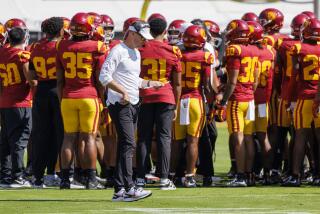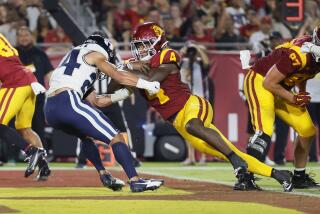Spreading the Word
Carson Palmer hesitated a bit walking into the USC football office last winter. He was going to meet his new boss.
For the better part of three decades, Norm Chow had engineered some of the best offenses in college football, nurturing such quarterbacks as Steve Young and Jim McMahon. His hiring as offensive coordinator at USC was heralded as a coup for the Trojans.
“I was nervous,” Palmer said of his first encounter with Chow. “He called me in, told me to sit down.”
And they proceeded to talk. About family. About classes. About anything but football.
“Just like two guys,” Palmer says. “I thought that was great.”
The next 10 times they met, it was the same thing. Chow spoke of commuting by plane to be with his wife and children in Utah. Palmer had lived through a similar experience with his father, Bill, who worked on the East Coast for four years.
“I just wanted him to feel comfortable,” Chow recalled. “I wanted him to be able to speak his mind.”
At one point, however, the coordinator delivered a message. Quietly and calmly, as befits his personality, he let the quarterback know what was at stake.
The fact is, the Trojans’ hopes for a winning season rest heavily on the offense. Chow has instituted a spread attack that features multiple receivers and rapid-fire passing, designed to take advantage of eight returning starters, the speedy Kareem Kelly, Keary Colbert and tailback Sultan McCullough among them.
For Palmer, the scheme offers a chance to erase memories of last fall when his team struggled to win and he too often forced passes, trying to make something happen, making mistakes instead. The junior has yet to meet the expectations that accompanied him to USC three years ago.
For Chow, who spent last season at North Carolina State after 27 years at Brigham Young, it is a matter of helping his new boss, Coach Pete Carroll, turn the program around.
“The only reason we’re here is because the other guys couldn’t get it done,” he said. “If we don’t get it done, someone else will be sitting here.”
At first blush, the quarterback and the coordinator seem an odd match. Palmer is 21, tall and blond, exceedingly Californian and more than a little reminiscent of one of his boyhood idols, Troy Aikman. At 55, Chow is bespectacled with graying hair, the kind of man who keeps his shirt tucked in and his shorts hitched high. His words still carry a hint of an accent from a Hawaiian upbringing.
Yet the two have much in common. They are calm by nature and sticklers for preparation.
“He reminds me so much of my dad,” Palmer said. “Real conservative. Real mellow.”
The offense needed a steadying hand. Players grew frustrated and unsure of themselves last season. Chow arrived with a streamlined attack, a slimmer playbook that has less to memorize.
All of the information comes from one source. Former Coach Paul Hackett and his offensive coordinator, Hue Jackson, alternated calling plays last season. Now, Carroll is focusing on defense and--while he and Chow will design the game plan during the week--the coordinator will call the shots when the team is on the field.
“With one guy running the show,” Palmer said, “everybody knows what’s going on.”
Not that the changeover has been entirely smooth. While Palmer possesses the size and arm strength to play the position, the spread offense has him moving more concisely, shortening his drop to three or five steps. That requires quick footwork from a man who stands 6 feet 5.
His thinking must be equally nimble. Each snap involves three, four or even five receivers and, from the shotgun, Palmer must be poised to throw as soon as the ball reaches his hands.
In some ways, it’s as simple as finding an open man and passing to him. But the decision-making must be sound.
Chow, who turned North Carolina State quarterback Philip Rivers into a freshman All-American, already describes Palmer as one of the finest technicians he has coached. He draws parallels to others he has worked with--Young and McMahon, Ty Detmer and Marc Wilson--citing the determination required for success.
“Carson is so dedicated,” Chow said. “He wants so badly to do well.”
But in some instances, that can be a problem. Chow wants to eliminate turnovers caused by Palmer’s insistence on making yardage from a play that is going nowhere. There is an art to tucking the ball under one arm and running, or simply throwing it away.
“He gets stubborn,” Chow said. “That’s what we’re trying to break him of.”
Much of the required teaching takes place on the field, where Chow barks at his players if they make a mistake but rarely yells or threatens. He makes his point, then moves on.
In the film room, players say, he takes a little more time to explain the nuances of his offense. So far, Palmer seems to be listening.
“It is Carson’s job to catch up and follow Coach Chow around,” Carroll said.
And, as evidenced by the last few months, it isn’t only football that Palmer wants to learn. There are other lessons, glimmers of which date back to their conversations last winter.
As they got to know each other, Palmer would come home and tell his father: “This guy is really cool.” He noticed how Chow’s telephone constantly rang with calls from friends around the country. He noticed how the coordinator treated others.
“He respects the lunch lady and the people who clean up the cafeteria,” Palmer said. “If you put all the football stuff aside, he’s a great person.”
The quarterback is following.
“I need to learn to walk in his footsteps.”
More to Read
Go beyond the scoreboard
Get the latest on L.A.'s teams in the daily Sports Report newsletter.
You may occasionally receive promotional content from the Los Angeles Times.







